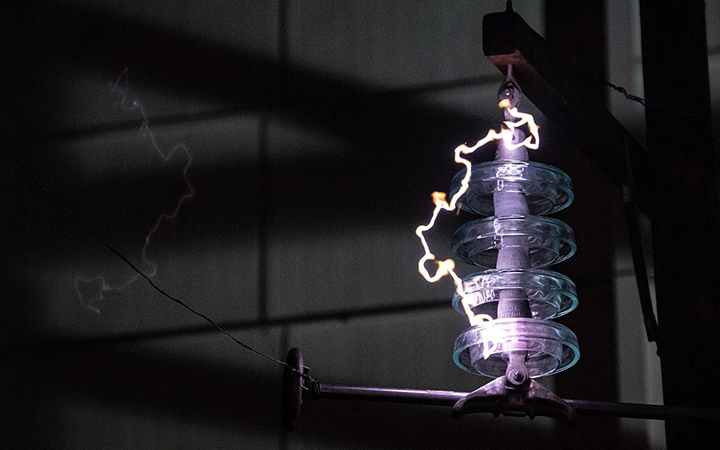High Voltage Lab at MSU prepares power companies to cope with the worst

A bolt of electricity makes its way through equipment in MSU's Paul B. Jacobs High Voltage Laboratory. As the largest lab of its kind among North American universities, it serves as a university research center for high voltage engineering. To help electrical companies during disasters, MSU recreates a variety of real-world scenarios inside the lab—falling trees, thunderstorms, solar radiation, high salt concentrations and more.
Mississippi State’s Paul B. Jacob High Voltage Laboratory simulates falling trees, thunderstorms, solar radiation, high salt concentrations, natural disasters and other likely scenarios plaguing electrical companies — like the catastrophic damage from Hurricane Helene.
David Wallace, lab manager and MSU assistant clinical professor of electrical and computer engineering, and his students can recreate a variety of real-world scenarios inside the lab. With these capabilities and the largest university-operated high voltage lab in North America, MSU helps power companies prepare for any likely threat to power lines.
“We can recreate what the equipment will see in nature to see how it reacts and then ask, ‘What do we need to change to make it work in these scenarios?’” Wallace said.
One major focus of the lab’s research is insulators, which keep electricity inside power line wires. Insulators also prevent electricity from reaching poles, towers and the ground.
“All power lines are supported by insulators,” Wallace said. “We have to ensure that if an earthquake comes, they don’t snap off—and if a fire comes, they don’t melt and allow the wires to touch.”
MSU is testing ceramic insulating materials, which can last for nearly 70 years. Wallace said because of ceramic’s fragility and weight, the industry also has created polymer, or plastic, insulators which are lighter but have a shorter shelf life.
Since ceramic and polymer insulators have individual issues, he said the lab is testing various insulating materials, as well as cables and transformers, and how they will work and react in the field.
"It’s the whole picture from the end product, to everything that goes into it and to the end user,” Wallace said. “I’m testing for all these different sections.”
He said this essential research isn’t only helping companies in Mississippi but the entire U.S., including the Department of Defense.
“Electrical power is the lifeblood of the world. If you take electricity out, we’re in the dark ages. We’ve got to ensure we can go forward,” Wallace said. “With changes happening, the bigger demand on electricity and the debate on fossil fuels, how are we going to generate new energy sources? That’s what we study.”
Wallace also stressed the importance of bringing in more power engineers to continue essential research. He said power engineering began to die when the computer was introduced and integrated, creating the need for more people to enter the field.
“All the old power engineers are retiring. I’ve been in this field since 1988, working on committees and serving as chair of various standards,” Wallace said. “At 58, I’m the young guy. We are in a desperate drought. We need engineers.”
Since joining the lab in 2016, Wallace has worked to build the power program at MSU, doubling the number of students in his time at the university.
At the lab, students receive hands-on experience in helping power companies grow and thrive. They also benefit from networking opportunities as they interact with industry leaders who work with the lab.
“This field is a great opportunity, and I love it. We’re the ones that make the world run. We provide the electricity,” Wallace said. “This is the time to be getting involved.”
Mississippi State University is taking care of what matters. Learn more at www.msstate.edu.
Aspen Harris | Bagley College of Engineering



